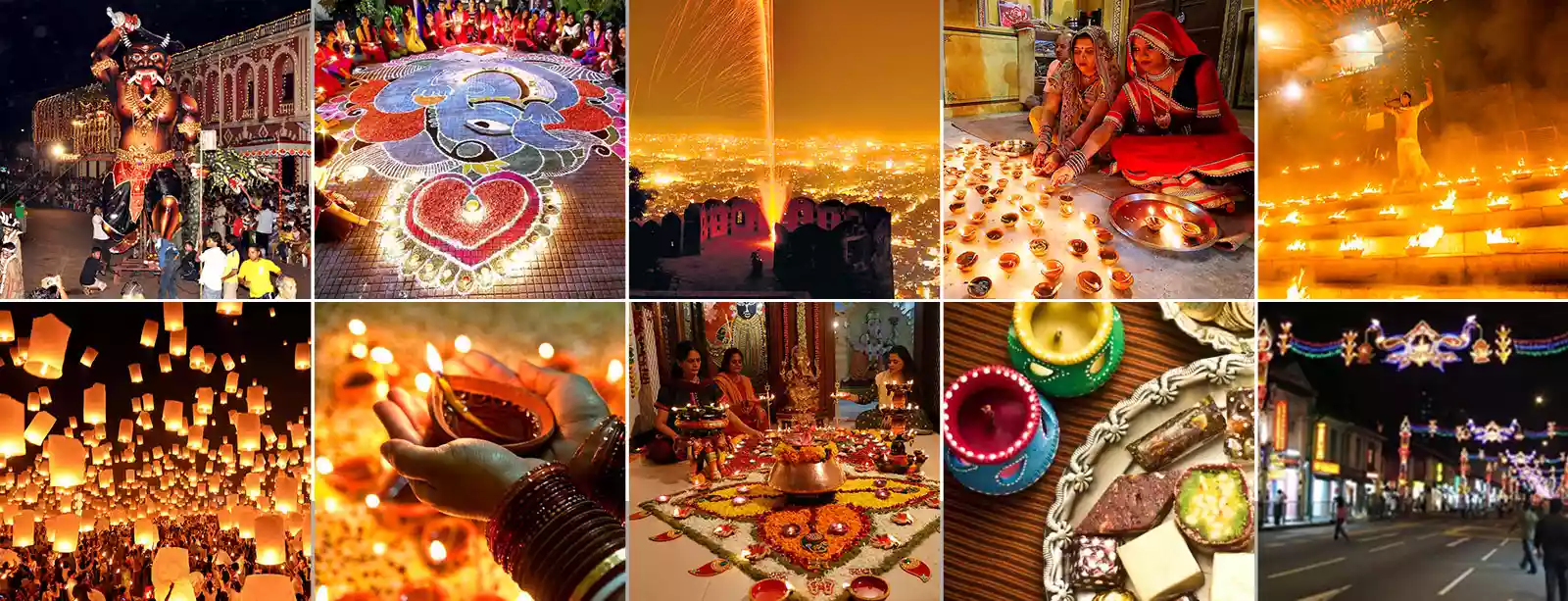why do we celebrate Diwali
2626 Oct 2024
Diwali, often called the Festival of Lights, is one of the most celebrated and beloved festivals in India and among communities worldwide. Rooted in ancient tradition, Diwali is observed for various historical, cultural, and spiritual reasons, each of which adds depth and meaning to the celebration. Here’s an exploration of the many reasons why Diwali is celebrated:

1. Victory of Light over Darkness and Good over Evil
- At its core, Diwali symbolizes the triumph of light over darkness, good over evil, and hope over despair. This theme resonates across various legends associated with Diwali, inspiring people to believe in the power of goodness, resilience, and inner strength. Lighting oil lamps (diyas) and decorating homes with lights reflects this victory, symbolizing a path away from negativity and ignorance toward enlightenment and joy.
2. Honoring Lord Rama’s Return to Ayodhya
- In Hindu mythology, Diwali marks the return of Lord Rama, his wife Sita, and his brother Lakshmana to Ayodhya after a 14-year exile and victory over the demon king Ravana. The people of Ayodhya celebrated their return by lighting oil lamps across the city, symbolizing joy and the restoration of righteousness. This story highlights the values of courage, loyalty, and duty and is celebrated with much devotion, especially in northern India.
3. Worship of Goddess Lakshmi: The Deity of Wealth and Prosperity
- Diwali is also associated with Lakshmi Puja, where Goddess Lakshmi, the goddess of wealth, fortune, and prosperity, is worshipped. People believe that Lakshmi visits homes that are clean, well-lit, and welcoming. This belief inspires families to clean, renovate, and decorate their homes and businesses in preparation for the festival, hoping for a prosperous year ahead. This aspect of Diwali also emphasizes gratitude and humility, reminding people to seek blessings for both spiritual and material wealth.
4. The Spiritual Awakening of Lord Mahavira (Jainism)
- For followers of Jainism, Diwali holds a special place as it marks the Nirvana or spiritual awakening of Lord Mahavira, the 24th Tirthankara. Lord Mahavira achieved liberation from the cycle of life and death on Diwali. Jains observe this day by lighting lamps to honor his path to enlightenment and to reflect on the values of compassion, non-violence, and spiritual awareness.
5. Sikh Observance: The Release of Guru Hargobind Sahib
- Sikhs celebrate Diwali as Bandi Chhor Divas, which commemorates the release of Guru Hargobind Sahib, the sixth Sikh Guru, from imprisonment by the Mughal emperor Jahangir. The Guru"s release, along with 52 other political prisoners, is remembered as a triumph of freedom and justice. Sikhs observe Diwali by visiting gurdwaras, where the Golden Temple in Amritsar is especially illuminated, symbolizing divine light and guidance.
6. Celebrating Harvest and New Beginnings
- In some regions, particularly in western India, Diwali coincides with the end of the harvest season. It’s a time to honor the year’s bounty, express gratitude, and seek blessings for the future. Many communities celebrate Diwali as their new year, embracing the festival as a time for fresh beginnings and renewing resolutions for health, happiness, and success.
7. Cultural Significance: Family, Community, and Festivity
- Diwali is a time when families and communities come together. Homes are adorned with rangolis, intricate designs made with colored powders, flowers, and diyas. People dress in new clothes, exchange sweets, and visit family and friends. Fireworks light up the sky, adding to the festive joy. This celebration fosters unity and bonds among communities, encouraging love, sharing, and joy in the warmth of togetherness.
8. Inner Reflection and Renewal
- Beyond the external festivities, Diwali is a time for introspection. Many people use this time to reflect on the past year, set new intentions, and cleanse themselves of negative thoughts and actions. Just as people clean their homes and surroundings, they also strive to clear their minds and hearts, embracing positivity and kindness.
In Summary:
Diwali’s celebration is multilayered, blending mythological stories, cultural traditions, and universal values. Whether it’s the return of Lord Rama, the spiritual awakening of Lord Mahavira, the teachings of Guru Hargobind Sahib, or the honoring of Goddess Lakshmi, Diwali unites people in a shared celebration of light, hope, and renewal. Through this festival, people across faiths and cultures celebrate timeless themes of love, joy, gratitude, and resilience, making Diwali a cherished and meaningful holiday worldwide.
1 likes
Top related questions
Related queries
Latest questions
06 Sep 2025 30
08 Aug 2025 65
07 Aug 2025 27
06 Aug 2025 60
02 Aug 2025 45
31 Jul 2025 20
